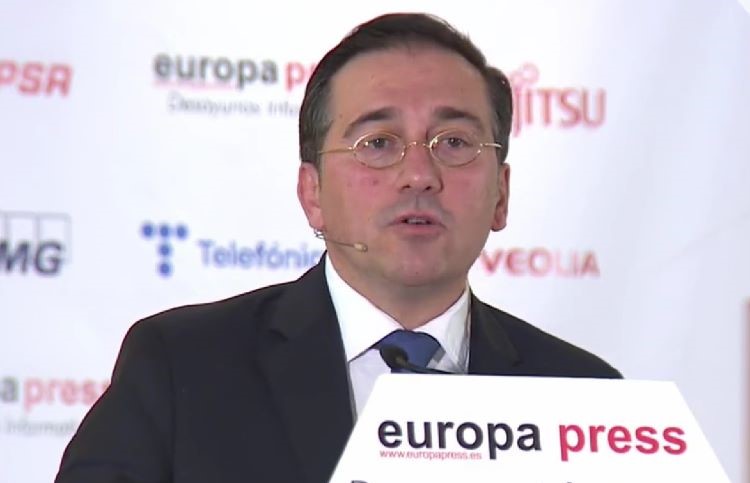Eduardo González
The Minister of Foreign Affairs, José Manuel Albares, preferred to reserve his opinion yesterday on the results of the elections in Italy, which gave victory to the far-right Giorgia Meloni, but he did warn, in express relation to it, that “populisms always end up the same way, catastrophically.”
“Italians have voted freely and legitimately, they have chosen who they believe should lead the country in the coming times,” Albares declared during a breakfast briefing organized by the Europa Press agency in Madrid. “As Minister of Foreign Affairs, I must avoid making assessments,” he warned.
However, the minister went on to warn that the Italian elections have taken place at a “very defining moment for Europe” in which two models are being set against each other: “a model, for which the Government of Spain and many European countries are betting, in favor of European construction” and based on values such as “democracy, the State of rights, pluralism, diversity and the renunciation of violence as a way of relating between States”, and another model “authoritarian, which does not believe in plurality and diversity and is contrary to the pillars of European construction”, and “in which political forces in Europe, also in Spain, are looking at”.
“In times of uncertainty, populisms always grow and always end up the same, in a catastrophic way, because they give simple answers in the very short term to very complex problems,” continued the minister, who recalled, however, that there are still “a few weeks” before the new coalition government is formed in Italy and that “no party has the majority, not by far.” Regarding the possibility that what happened in Italy could be transferred to Spain in 2023, Albares was categorical: “It has nothing to do with it, each country lives very different circumstances”.
Ukraine and Russia
On the other hand, Albares insisted on Spain’s rejection of the illegal referendums organized by Russia in the Dombas, in Ukraine, which have “neither the minimum basis nor the minimum guarantees” and, therefore, will not receive “any recognition by anyone, certainly not by Spain”. “This latest military escalation of Russia”, which is going to bring “more suffering for all”, demonstrates “its military defeat” and its “political defeat”, reflected in the “very broad rejection” of the UN General Assembly, declared Albares.
In any case, the minister warned against “distressing Spaniards and Europeans” with Russia’s nuclear threats because “there is no real indication that Vladimir Putin is going to propose anything other than an escalation of conventional war” and because “there is no way to win a nuclear war, we all lose in that war”. This nuclear threat, he affirmed, “flies from time to time, although less veiled at other times”, and it is “absurd and irrational to use it”.
The minister also assured that Spain is “totally favorable” to the reception of Russian refugees fleeing Putin’s regime, especially “NGOs, human rights defenders and journalists who are risking their lives”. However, he warned, this reception must be carried out “in a context that provides security”, because “there cannot be an avalanche of Russian citizens without knowing who is entering, a case-by-case analysis must be made”.
Venezuela
Regarding his recent meeting in New York with the new Foreign Minister of Venezuela, Carlos Faria, in the margins of the opening of the 77th session of the United Nations General Assembly, Albares assured that his intention is “to speak with all the actors to defend the dialogue in Venezuela” and that, during the meeting with his counterpart, he conveyed to him, “as I have conveyed to all those with whom I have met, such as Leopoldo López (opposition leader currently exiled in Spain)”, that the Spanish Government “accompanies the dialogue because the solution in Venezuela must come from the Venezuelans themselves”.
“Spain neither wishes nor has any interest in deciding who is the president of Venezuela, that is for the Venezuelans to decide,” he assured. “I am surprised by some amalgamations of the main opposition force (PP), which mixes everything up because perhaps they want to be the ones to decide who should be the president of Venezuela, when it is the Venezuelans who have to decide it”, he concluded.






